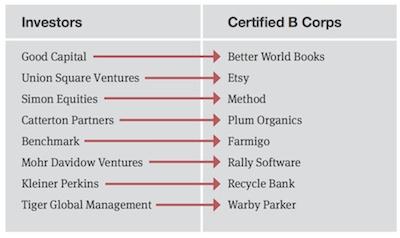
This is the eighth in a weekly series of excerpts from the upcoming book "The B Corp Handbook: How to Use Business as a Force for Good"(Berrett-Koehler Publishers, October 13, 2014). Click here to read the rest of the series.
By Ryan Honeyman
Ahh--the perennial debate: will becoming a Certified B Corp help or hurt my ability to raise capital?
Like most things in life, it's not a 100% black or white answer. It depends on where (and from whom) you are trying to raise capital. In my opinion, however, it is starting to look pretty good for B Corps (just ask CircleUp, which recently partnered with Collaborative Fund to invest $4 million exclusively in Certified B Corporations).
While researching and writing "The B Corp Handbook," I found that B Corp certification can help you attract: mission-driven or impact investors who consider social, environmental and financial criteria in their investment decisions; mainstream investors who are primarily interested in strong financial returns; and larger companies interested in acquiring a cutting-edge and innovative brand.
For example, Plum Organics, a fast-growing organic baby food company, was sold to and is now a wholly owned subsidiary of the Campbell Soup Co. Rather than viewing Plum Organic’s B Corp certification as an impediment, Campbell’s saw the B Corp certification as a valuable asset that could help Plum retain the trust of its most loyal customers after the sale. To show its support, Campbell’s helped Plum Organics register as one Delaware’s first benefit corporations when the law came into effect in August 2013.
Method’s recent merger followed a similar path. Method, the quirky, B Corp–certified maker of home cleaning products, was acquired in 2013 by Ecover, a leading European cleaning company. Ecover also supported Method in registering as a Delaware benefit corporation, and now Ecover itself is considering whether to become a founding European Certified B Corporation.
As mentioned, becoming a B Corp can help a company raise capital from a wide variety of investors. For example, mainstream venture capitalists such as Kleiner Perkins Caufield & Byers, New Enterprise Associates, and Tiger Asset Management are investing in Certified B Corporations because they have found that B Corps can be great financial investments. Union Square Ventures, a venture capital firm that invested in Etsy (and has also invested in Twitter, Zynga and Foursquare), says B Corps are appealing because the companies that produce the most stakeholder value over the next decade will also produce the best financial returns.
"Our shareholders knew about and supported our B Corp certification. Harvest Power is focused on profitability as a business, and I don’t think becoming a B Corporation contradicts that." -- Paul Sellew, Founder and Chairman, Harvest Power
Another benefit of becoming a B Corp is that all Certified B Corps receive a free Global Impact Investment Rating System rating and a free listing on B Analytics, an investor-facing platform designed by B Lab. This can help your company raise money, because a large number of investors with billions of dollars of assets under management—from global financial institutions such as JPMorgan, Prudential and UBS to leading impact investors such as Good Capital, Renewal Funds and RSF Social Finance — prefer to invest in GIIRS-rated companies (and Certified B Corps) because they trust the rigorous, comparable, and verified social and environmental performance metrics.
In addition, B Lab can also help you raise money by making direct introductions to the many Certified B Corps in the financial services industry (including commercial banks, venture funds, asset managers, wealth advisors and investment banks) as well as to the wide variety of funds and institutional investors that use B Lab’s B Analytics platform. For example, B Lab introduced United By Blue, a B Corp–certified apparel company based in Philadelphia, to Investors’ Circle, a group of local impact investors. After several meetings, Investors’ Circle decided to make the largest investment in the organization’s history, helping United By Blue expand its wholesale business into retail.
"It’s been very helpful to be able to point to our B Corp certification—and inviting potential investors to look into the B Corp methodology—as a “one-stop shop” to show how we measure our social and environmental impact." -- Ben Sandzer-Bell, CEO, CO2 Bambu
Finally, check out this classic TriplePundit article on Direct Public Offerings. A Direct Public Offering allows companies to raise money from a wide variety of people in the community and offer them investment opportunities such as stock, notes, and revenue sharing agreements.
Ryan Honeyman is a sustainability consultant, executive coach, keynote speaker, and author of The B Corp Handbook: How to Use Business as a Force for Good. Ryan helps businesses save money, improve employee satisfaction, and increase brand value by helping them maximize the value of their sustainability efforts, including helping companies certify and thrive as B Corps. His clients include Ben & Jerry’s, Klean Kanteen, Nutiva, McEvoy Ranch, Opticos Design, CleanWell, Exygy, and the Filene Research Institute.
To get exclusive updates and free resources that can help you learn more about B Corporations, sign up for Ryan’s monthly newsletter. You can also visit honeymanconsulting.com or follow Ryan on Twitter:@honeymanconsult.

Ryan Honeyman is a sustainability consultant, executive coach, keynote speaker, and author of "The B Corp Handbook: How to Use Business as a Force for Good" (Berrett-Koehler Publishers, October 2014), the world’s first book on B Corporations.
Ryan helps businesses save money, improve employee satisfaction, and increase brand value by helping them maximize the value of their sustainability efforts, including helping companies certify and thrive as a B Corp. His clients include Ben & Jerry’s, Klean Kanteen, Nutiva, CleanWell, Exygy, and the Filene Research Institute.
Honeyman Sustainability Consulting, a Certified B Corporation, was recently honored—alongside Patagonia, Seventh Generation, New Belgium Brewery, GoLite, and Method—on the 2014 B Corp “Best for the Environment List,” which recognizes businesses that have scored in the top 10% of all B Corps worldwide for positive environmental impact.
Ryan has written articles for Utne Reader, TriplePundit, Sustainable Industries, and the Credit Union Times. He has also been a featured speaker at the Wharton School of Business at the University of Pennsylvania, the Hass School of Business at the University of California, Berkeley, San Francisco State University, Mills College, the California College of the Arts, the Sustainable Enterprise Conference, the Marin Renaissance Entrepreneurship Center, the New Sector Alliance, Nextspace, the Impact Hub Oakland, and the Impact Hub SoMa in San Francisco.
Ryan holds a B.A. from the University of California, Santa Cruz and a M.Sc. from the London School of Economics and Political Science.














